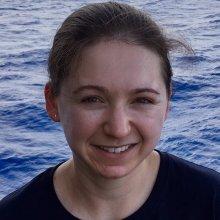
Allisa Dalpe
Tell us about your work/research. What kinds of things do you do?
As a Research Engineer in the Deep Submergence Laboratory at the Woods Hole Oceanographic Institution (WHOI), I work with a variety of underwater vehicles such as Nereid Under Ice (NUI), Sentry, and Clio. On this specific expedition I am here as a member of the Sentry team. My work is typically software-focused. At sea, this can involve tasks such as troubleshooting systems, performing data analysis, or navigating the vehicle. Back on shore, my time is usually spent on the research and development of new tools and features for the vehicles.
What sparked your initial interest in your career?
My experience as a student and deckhand with SEA Semester (Sea Education Association), in addition to growing up on Cape Cod, sparked my initial interest in my career. A favorite moment during SEA Semester occurred while jumping off the ship’s bowsprit to the ocean below. After entering the water, bobbing back up to the surface, and floating next to the ship, the question inevitably becomes, what lies underneath? We were in the middle of the Atlantic Ocean in water depths over 3 miles deep. As far as the eye could see was the ocean’s surface, but what about the world of life going on beneath my feet? That same night we saw jellyfish the size of car tires (which definitely made me question my choice to go swimming earlier), dolphins shimmering with bioluminescence, and numerous organisms in the Neuston Net tow—further proving much life was going on below the surface. This question and curiosity drive my motivation for ocean research. These experiences, coupled with obtaining a physics degree from Connecticut College, led to the transition to ocean engineering for graduate school.
Who influenced you or encouraged you the most?
My parents have been incredibly supportive and have always encouraged me to pursue what I love to do (even if that means being out in the middle of the ocean thousands of miles away from home). My high school, Falmouth Academy, was also highly influential to me. I was fortunate to have several amazing teachers that provided a supportive environment for students to build confidence in themselves, and that taught students how to become active learners, question the world around them, and to articulate those ideas and thoughts effectively. These have been invaluable tools I use every day in my career.
What element of your work/study do you think is the most fascinating?
I find exploring the unknown and pushing technology every day is the most fascinating part of working in this field. There is much left to explore and the ocean environment poses so many challenging, but exciting, engineering problems.
What other jobs led you to your current career?
My first academic internship was in a particle accelerator lab at Connecticut College looking at ion-molecule collisions. Through that experience, I found I really enjoyed engineering and hands-on work, however, I decided that I wanted to be in an outdoor setting. The next summer I worked as an intern at Woods Hole Group, Inc., an international ecological, coastal and oceanographic consulting organization. During graduate school, I spent a summer at the Naval Undersea Warfare Center – Division Keyport, WA working with autonomous vehicles. Also during graduate school, I was able to gain field experience through a seafloor mapping internship with the Okeanos Explorer and ROV engineering internship onboard Nautilus.
What are your degrees and certifications?
Ph.D Ocean Engineering -- University of New Hampshire 2021; B.A Physics -- Connecticut College 2016; MA Hoisting Engineer License
What are your hobbies?
I enjoy skiing and snowmobiling during the winter months and being out on the water with family and friends during the summer.
How did you get involved with the Nautilus Exploration Program?
I initially became involved with the Ocean Exploration Trust while I was in graduate school. I participated in the SEIP program as a ROV Engineering Intern during the summer of 2019. I have returned as an engineer for the Woods Hole Oceanographic Institution as part of the Nereid Under Ice (NUI) team.
What advice would you give someone who wants to have a career like yours?
Try to get involved with internships as early as possible. I found that those experiences really helped shape my future career direction and taught me skills that could not be replicated in the classroom.
I find exploring the unknown and pushing technology every day is the most fascinating part of working in this field. There is much left to explore and the ocean environment poses so many challenging, but exciting, engineering problems.
Expeditions
Allisa participated in the following Ocean Exploration Trust expeditions:






